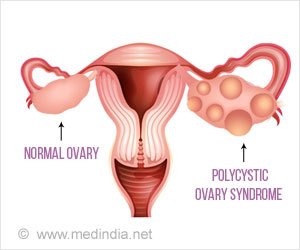Could PCOS Be Amplifying Mental Health Struggles for Women Worldwide?

Research has shown a high prevalence of severe depressive symptoms linked with PCOS , underscoring the need for improved emotional support and counseling for sufferers. The challenges extend to matters of fertility, compounding distress in societies where motherhood is culturally expected, placing a burden on women for any fertility-related setbacks.
The Asia Pacific Initiative on Reproduction (ASPIRE) conference in South Australia highlighted ethnic disparities in PCOS prevalence across the globe, with a greater incidence in countries like India, Pakistan, Nepal, and others. For South Asian women with PCOS, the risks escalate to include cardiometabolic conditions such as
, diabetes, and liver disease.
The 2023 ASPIRE Congress aims to delve into the causes and consequences of PCOS, accompanied by the release of new international guidelines for diagnosing and treating the condition. Dr. Duru Shah, Founder and President of the PCOS Society of India, emphasized that PCOS is a complex interplay of reproductive, endocrine, and metabolic factors, potentially rooted in genetics, lifestyle, or environment. She stressed the common delays in diagnosis, particularly among young women.
Advertisement
Anxiety and depression frequently plague PCOS sufferers, often revolving around cosmetic concerns like obesity, hirsutism, and acne, as well as the associated infertility. Dr. Shah advocated for incorporating an hour of exercise in schools and serving healthy snacks in canteens to address these issues.
Dr. Madhuri Patil, Vice-President of the PCOS Society of India, noted significant differences in PCOS symptoms across races and regions, potentially linked to genetic factors. She called for a spotlight on healthy lifestyle choices to counteract excess weight gain.
The PCOS Society of India launched a substantial community awareness initiative to educate girls and women about PCOS and its implications.
In China, the prevalence of PCOS in women has been on the rise, displaying variations across regions, occupations, and age groups. The new 2023 evidence-based international guidelines, crafted by over 1,000 healthcare professionals, redefine PCOS not merely as a reproductive condition but as an endocrine disorder with far-reaching psychological, cardiometabolic, and reproductive effects.
PCOS: A Leading Cause of Infertility, with up to 70 Percent of Women Experiencing it
Professor Helena Teede, lead author and endocrinologist, stressed that timely diagnosis is paramount, especially in adolescence. Up to 70 percent of PCOS cases can be diagnosed based on irregular menstrual cycles and hyperandrogenism, encompassing symptoms like acne and hirsutism.
For adults lacking these features, ultrasound or anti-müllerian hormone (AMH) blood tests are now recommended.
The guidelines also now recognize cardiovascular disease as a core feature of PCOS, prompting all women to undergo a lipid profile at diagnosis, regardless of age or BMI. Additionally, there is a newfound emphasis on monitoring male first-degree relatives of women with PCOS for potential metabolic syndrome, type 2 diabetes, and hypertension.
Family studies indicate a 2.3-fold increased risk for type 2 diabetes and a 1.4-fold increased risk for metabolic syndrome in fathers, and a 3.9-fold increased risk for dyslipidemia in brothers of women with PCOS (1✔ ✔Trusted Source
High prevalence of moderate and severe depressive and anxiety symptoms in polycystic ovary syndrome: a systematic review and meta-analysis
Go to source).
Managing and Combating PCOS
Managing and combating Polycystic Ovary Syndrome (PCOS) involves a multifaceted approach that addresses both the physical and psychological aspects of the condition. Here are some strategies to help combat PCOS:
-
Consult with a Healthcare Professional:
Start by seeking medical advice from a healthcare provider who specializes in PCOS. They can provide a thorough evaluation, diagnosis, and personalized treatment plan tailored to your specific needs
-
Lifestyle Modifications:
-
Diet: Adopt a balanced and nutritious diet. Focus on whole foods, fruits, vegetables, lean proteins, and complex carbohydrates. Minimize processed foods, sugar, and excessive caffeine - Exercise: Incorporate regular physical activity into your routine. Exercise can help regulate hormones, manage weight, and improve insulin sensitivity
- Weight Management: If overweight, aim for gradual, sustainable weight loss, as even a modest reduction in weight can have significant benefits for PCOS management
-
-
Medications:
Depending on your symptoms and specific needs, your healthcare provider may prescribe medications such as birth control pills, anti-androgen medications, or insulin-sensitizing drugs to manage hormonal imbalances -
Manage Stress:
Stress can exacerbate PCOS symptoms. Practice stress-reduction techniques such as mindfulness, meditation, yoga, or deep breathing exercises -
Regular Monitoring:
Continue to work closely with your healthcare provider to monitor and adjust your treatment plan as needed. PCOS may require long-term management -
Support Groups:
Join a PCOS support group or connect with others who have PCOS. Sharing experiences and advice with others who understand the condition can be comforting and informative -
Education:
Educate yourself about PCOS and its potential complications. Understanding the condition empowers you to make informed decisions about your health -
Regular Check-ups:
Schedule regular check-ups with your healthcare provider to monitor your overall health and assess any potential complications, such as cardiovascular issues or diabetes
Remember that PCOS management is highly individualized, and what works for one person may not work the same way for another.
In conclusion, understanding the profound impact of PCOS on both physical and mental well-being is crucial. By raising awareness and advocating for better support systems, we can empower women worldwide to navigate this challenge with resilience and strength.
As Helen Keller wisely said, “Although the world is full of suffering, it is also full of the overcoming of it.” Let us stand together in support and solidarity, believing that with knowledge, compassion, and determination, we can help women triumph over the struggles imposed by PCOS.
Reference :
- High prevalence of moderate and severe depressive and anxiety symptoms in polycystic ovary syndrome: a systematic review and meta-analysis – (https:pubmed.ncbi.nlm.nih.gov/28333286/)
Source: Medindia
Source link
#PCOS #Amplifying #Mental #Health #Struggles #Women #Worldwide



